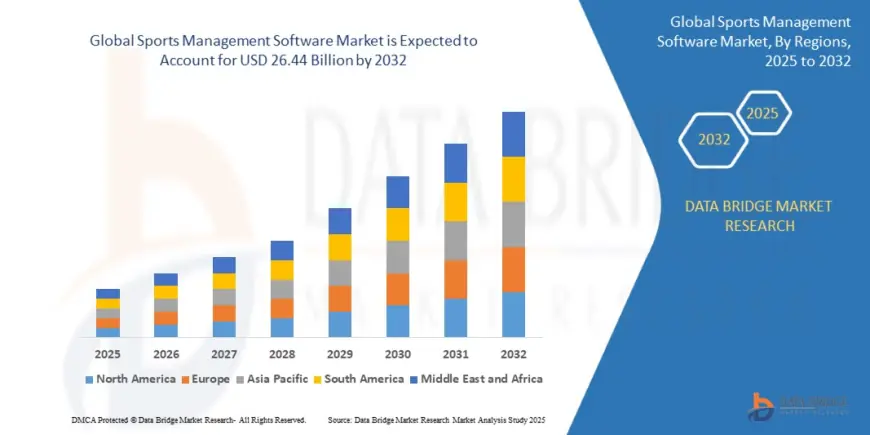Sports Management Software Market Industry Statistics: Growth, Share, Value, Insights, and Trends

Introduction
The sports industry has witnessed a significant digital transformation over the past decade. One of the most crucial innovations has been the introduction of sports management software, which helps streamline operations, enhance athlete performance, and improve fan engagement. From managing team logistics to analyzing game performance, this software plays a pivotal role in modern sports.
In this article, we will explore the sports management software market, its growth trends, challenges, key players, and future potential.
Understanding Sports Management Software
What is Sports Management Software?
Sports management software is a digital solution designed to automate, organize, and streamline various aspects of sports administration. It caters to sports clubs, coaches, event organizers, and even athletes to manage their operations more efficiently.
Key Functionalities and Features
-
Team Management – Organizing player rosters, schedules, and training plans.
-
Game and Event Management – Planning tournaments, fixtures, and venue bookings.
-
Analytics and Performance Tracking – Evaluating athlete performance through data analysis.
-
Financial and Membership Management – Handling payments, sponsorships, and ticketing.
-
Communication and Fan Engagement – Enhancing interaction between teams, players, and fans.
This software serves as a one-stop solution for sports organizations to streamline processes and improve efficiency.
Market Growth and Trends
The sports management software market is experiencing exponential growth due to increased digitalization in the sports industry. Key trends include:
-
Adoption by Clubs and Leagues – Major sports organizations are integrating software solutions for better management.
-
Rise of Cloud-Based Solutions – The shift towards cloud computing ensures remote accessibility and scalability.
-
Data-Driven Decision-Making – Advanced analytics are helping coaches and managers make informed choices.
-
Integration with Wearable Technology – Smart devices provide real-time performance insights for athletes.
According to market research, the global sports management software market is expected to grow at a CAGR of over 13% in the coming years.
Key Market Drivers
Several factors are fueling the growth of the sports management software market:
-
Demand for Automation and Efficiency – Sports organizations seek tools that simplify operations.
-
Growing Number of Sporting Events – Increased competitions require better event management solutions.
-
Rising Popularity of Data Analytics – Data-driven insights improve performance and engagement.
-
Fan Engagement Technologies – Interactive solutions enhance the experience for supporters.
-
Sponsorship and Revenue Management – Managing finances and partnerships effectively.
These factors make sports management software a necessity rather than a luxury for teams and leagues.
Challenges in the Sports Management Software Market
Despite its rapid growth, the industry faces several challenges:
1. High Initial Investment Costs
Many small and amateur sports clubs find it difficult to afford high-end software solutions.
2. Integration with Existing Systems
Organizations struggle to integrate new software with legacy systems and traditional management practices.
3. Data Security and Privacy Concerns
Since the software handles sensitive player and team data, ensuring robust cybersecurity measures is crucial.
4. Resistance to Digital Transformation
Some traditional sports organizations are reluctant to adopt new technological solutions.
Addressing these challenges is essential for the market to expand and reach more sports organizations worldwide.
Types of Sports Management Software
Sports management software comes in various types, each catering to specific needs within the sports industry. The major categories include:
1. Team Management Software
This type helps coaches and team managers streamline their operations by organizing schedules, rosters, player data, and communication.
-
Example Features:
-
Automated scheduling
-
Player performance tracking
-
Injury and health monitoring
-
Attendance and participation tracking
-
2. Event Management Software
Designed for organizing sports events, tournaments, and competitions, this software ensures smooth operations for event organizers.
-
Example Features:
-
Venue booking and logistics
-
Ticket sales and registration
-
Live scoring and results management
-
Communication tools for teams and officials
-
3. Training and Performance Analysis Software
Athletes and coaches use this software to improve individual and team performance through data-driven insights.
-
Example Features:
-
Video analysis and playback
-
Biometric and fitness tracking
-
AI-driven performance predictions
-
Personalized training programs
-
Each category plays a crucial role in enhancing the sports experience, whether for professional teams, leagues, or amateur sports clubs.
Applications in Different Sports Segments
Sports management software is not limited to professional teams; it is widely used across various levels of sports.
1. Professional Sports Teams
-
Elite clubs and franchises use software to manage player contracts, analytics, and fan engagement.
-
Helps in injury prevention and recovery tracking through advanced data analysis.
2. Amateur and Youth Sports Organizations
-
Facilitates team coordination, player registrations, and game scheduling.
-
Enables coaches and parents to track progress and communicate efficiently.
3. Sports Academies and Training Centers
-
Used for tracking athlete development and improving training methods.
-
Helps in identifying and nurturing young talent through data insights.
These applications highlight how the software is revolutionizing both professional and grassroots sports.
Top Players in the Market
Several companies are leading the way in the sports management software industry, offering innovative solutions. Some of the top players include:
-
TeamSnap – A popular tool for managing youth and amateur sports teams.
-
SportsEngine – A comprehensive platform for leagues, clubs, and associations.
-
Hudl – Focuses on video analysis and performance tracking.
-
SAP Sports One – Provides advanced analytics for professional teams.
-
Stack Sports – Offers solutions for event management and team coordination.
These companies continuously innovate to meet the evolving demands of the sports industry.
Regional Analysis
1. North America
-
The largest market for sports management software due to the popularity of professional leagues like the NFL, NBA, and MLB.
-
High adoption of technology among sports organizations and fans.
2. Europe
-
Increasing demand due to the popularity of football (soccer), rugby, and cricket.
-
Clubs and leagues investing heavily in data analytics and AI-driven performance tracking.
3. Asia-Pacific
-
A rapidly growing market driven by cricket, football, and eSports.
-
Governments and private investors supporting sports technology adoption.
Each region has distinct growth factors, contributing to the global expansion of the market.
Future Trends and Predictions
The sports management software market is expected to evolve with new technologies, including:
1. AI and Machine Learning in Sports Management
-
AI-powered analytics to predict player performance and injury risks.
-
Automated coaching assistants using real-time data insights.
2. Blockchain for Transparent Transactions
-
Secure contract management and ticket sales using blockchain.
-
Prevention of fraud and unauthorized data access.
3. Integration with Wearable Technology
-
Smart devices providing real-time health and fitness monitoring.
-
Enhanced training efficiency through biometric tracking.
These innovations will shape the future of the sports industry, making it more data-driven and efficient.
Impact of COVID-19 on the Market
The pandemic accelerated the adoption of sports management software in various ways:
-
Virtual Training Solutions – Teams adopted remote coaching and online training platforms.
-
Contactless Event Management – Digital ticketing and virtual fan engagement became essential.
-
Data-Driven Decision-Making – Clubs relied more on analytics to optimize player fitness and game strategies.
Even post-pandemic, these trends continue to influence the industry, pushing for more digital transformation.
Investment and Funding in the Industry
The sports tech industry has seen increased investment in recent years, including:
-
Venture capital interest in AI-driven sports analytics platforms.
-
Acquisitions and mergers among top software providers to expand services.
-
Government and private funding supporting digital transformation in sports organizations.
This investment ensures continued growth and innovation in the market.
Sports Management Software for Coaches and Athletes
For Coaches
-
Tools to create game strategies and training schedules.
-
AI-assisted performance tracking to improve decision-making.
For Athletes
-
Personalized fitness and nutrition plans.
-
Real-time feedback to enhance skills and prevent injuries.
Both coaches and athletes benefit from data-driven insights and automation.
How to Choose the Right Sports Management Software
When selecting software, organizations should consider:
-
Ease of use and user interface – Simple navigation is key.
-
Scalability – Can it grow with your team or league?
-
Cost and pricing models – One-time purchase vs. subscription-based plans.
-
Customer support and updates – Regular updates ensure long-term usability.
Choosing the right software can significantly enhance operations and efficiency.
Conclusion and Future Outlook
The sports management software market is evolving rapidly, driven by digital transformation, AI, and data analytics. It plays a crucial role in streamlining operations, enhancing athlete performance, and improving fan engagement.
As technology continues to advance, the future of sports management software looks promising, with more automation, AI-driven insights, and seamless integrations shaping the industry.
Get More Links : https://www.databridgemarketresearch.com/reports/global-sports-management-software-market
https://www.databridgemarketresearch.com/reports/global-joint-compound-market
https://www.databridgemarketresearch.com/reports/global-amniotic-products-market
https://www.databridgemarketresearch.com/reports/middle-east-and-africa-travel-beauty-retail-market
https://www.databridgemarketresearch.com/reports/global-travel-beauty-retail-market
https://www.databridgemarketresearch.com/reports/global-automotive-aerodynamic-market
FAQs
1. What is sports management software used for?
Sports management software is used to organize team logistics, track player performance, manage events, and handle financial operations for sports organizations.
2. How does AI impact sports management software?
AI enhances player performance analysis, injury prevention, and game strategy planning by processing real-time data insights.
3. Is sports management software expensive?
The cost varies based on features and subscription models, with options ranging from affordable solutions for small teams to advanced software for professional leagues.
4. Can small sports clubs benefit from sports management software?
Yes! Many platforms offer affordable and customizable solutions for small clubs, allowing them to streamline operations and improve efficiency.
5. What are the future trends in sports management software?
Upcoming trends include AI-driven coaching, blockchain for contract management, and integration with wearable technology to enhance real-time performance tracking.
What's Your Reaction?
 Like
0
Like
0
 Dislike
0
Dislike
0
 Love
0
Love
0
 Funny
0
Funny
0
 Angry
0
Angry
0
 Sad
0
Sad
0
 Wow
0
Wow
0
Related Posts
Medical Fixation Devices Market Set to Witness Explosiv...
nitinrrr Nov 30, -0001 0















































